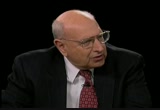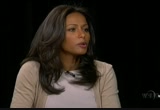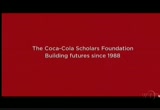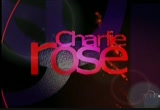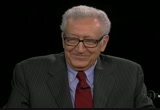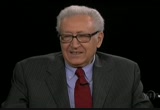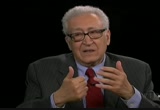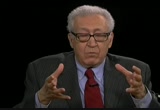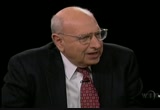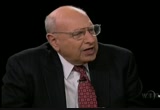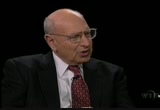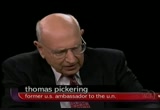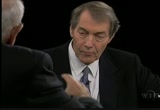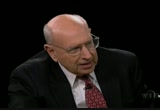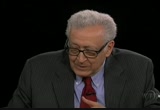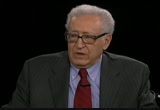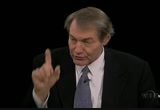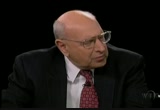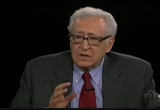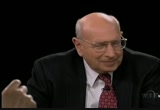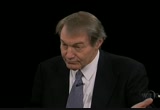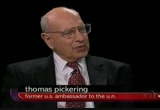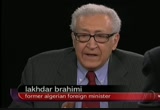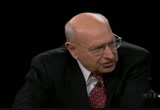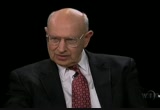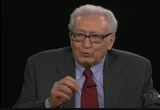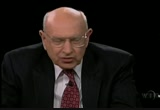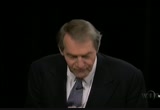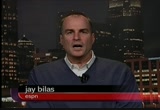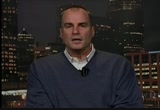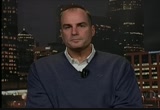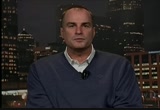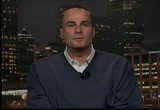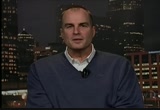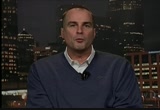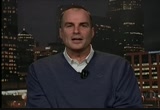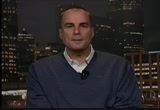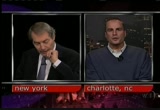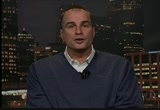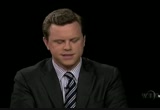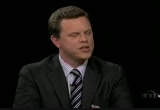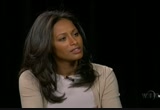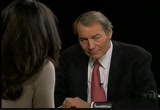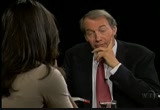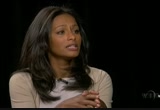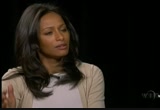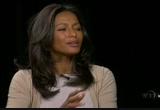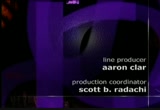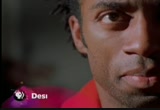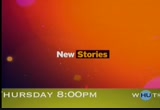tv Charlie Rose WHUT March 24, 2011 9:00am-10:00am EDT
9:00 am
>> charlie: welcome to our program. tonight with a look at afghanistan and a new report about negotiations. we'll talk to former difficult lat from the united nations lakhdar brahimi and secretary of state thomas pickering. >> this is a good time to start saying yes now, the other side is ready to consider it. we are fairly certain that it is now high time to find out with the taliban and pakistan and others are ready. >> now we need a diplomatic surge. it's simple to me. i say this all the time.
9:01 am
all wars end with political consequences. do you want to help shape them or do you want somebody to shape them for you. >> charlie: as march madness moves to the sweet 16, we talked to espn jay bilas and for morning joe way too early willie geist. >> it's an eclectic group. it's not a lot of the blue bloods and thoroughbreds of college basketball twheat haven't seen in a while. >> as jay says ohio, you got the senior and this kid who is a three-point shoulder can shoot you to a he win. >> charlie: we conclude with author rula jebreal her novel is strikes her life called miral.
9:02 am
>> i felt i had to arne people in my life, my teacher and my father. and that it would affect girls life and maybe through my simple story they can see something and how to survive in a war zone. that's why i wrote it. >> charlie: a program note, linda wells, the editor of allure was supposed to be on tonight's broadcast, she will be seen next week. tonight, afghanistan, the sweet 16 and rula jebreal when we continue. ♪ if you've had a coke in the last 20 years, ( screams ) you've had a hand in giving college scholarships... and support to thousands of our nation's... most promising students. ♪ ( coca-cola 5-note mnemonic )
9:03 am
every story needs a hero we can all root for. who beats the odds and comes out on top. but this isn't just a hollywood storyline. it's happening every day, all across america. every time a storefront opens. or the midnight oil is burned. or when someone chases a dream, not just a dollar. they are small business owners. so if you wanna root for a real hero, support small business. shop small. captioning sponsored by rose communications from our studios in new york city, this is charlie rose.
9:04 am
>> charlie: we continue our series of conversations about the mission in afghanistan. president obama has set this team to hand over securities for the national forces. speaking yesterday afghan president karzai outlined the first phase of that transfer. he named seven areas where afghan forces will assume primary responsibility this summer. their growing concern that the army and government may not be ready. a new report published today by the century foundation says the conflict has reached a stalemate, and that the only solution is a negotiated political settlement. it is called afghanistan negotiated peace. joining me now the two chairing ambassador lakhdar brahimi and ambassador thomas pickering. they have experience in this part of the world and the u.s. state department. i'm glad to have them back on
9:05 am
this show but never tog togethen this report. >> i think that the century foundation had an idea that somehow the two of us might be able to work with them and an international group. we had nine internationals and seven americans, and produce something that really could be useful as they looked ahead. it was a little early, as you know, because negotiations have only begun to catch on. so we caught it at the right time, i think, to be helpful. and it was certainly when i was asked and they said lakhdar is there, i said you count me in. >> charlie: why would you say that. >> nobody's had more experience on the ground and with people in the region on afghanistan in particular than lakhdar brahimi. and for any of us, it's always a privilege and an honor to be associated with him. he has ideas, he has judgment, he has sophistication.
9:06 am
it's all there, charlie. you'll want to talk to him. >> charlie: we'll see. >> speaking arabic -- [laughter] >> charlie: you went looking for what? >> an answer to the fact that afghanistan has been neglected for a very very long time. starting in 2001 after the catastrophe of the attack on the united states, i and a lot of people thought that this time the international community was going to help afghanistan. and i think that the international community has helped afghanistan. but at the same time, i think we made a lot of mistakes. the result is that a lot of improvement has taken place in the country, in almost every phase except in one extremely
9:07 am
important field and that is security. so everything was moving up and security was moving down. every year the situation was worse. why? this is a question i think we have. why is the security situation is there. lots of things have been tried that didn't work. and we thought that, you know, perhaps all the fashion diplomacy can help a little bit. and that, there are two circles, as it were. the internal track, the afghans have been fighting one another for a very long time. is it possible to help them make peace among themselves. the neighbors of afghanistan haven't been very good to afghanistan for a very very long time. can that change. and i think in looking at this
9:08 am
question, with the help of friends and colleagues from my country and the united states, we have come to the conclusion that what you need is a negotiated settlement. it is extremely difficult, complicated but doable. >> charlie: how do you do it? >> you do it, in our view, by looking first at whether you can find someone heavily involved in that part of the world but neutral enough to be able to take on the first stage of a process we outlined in the report. and that first stage is an exploration as we started ourselves with all of the parties that you can be in touch with. that's why someone has to be credible to all the players and that's very significant. that someone could be obviously
9:09 am
a foreign government. it could be a group, it could be an individual, it could be an international organization. but to spend some time and answer two questions simply, one, is there enough interest and potential commitment to a negotiating process here to go forward. and two, in evaluating what their positions are, this person or group believe that there is a potential for a coming together, if i can put it that way. a the critical issues on afghanistan, and we outline those and we say they are governance and many questions of governments lay at the center of this. this is a question about the future of the country, who governs, who assumes power, where and under what circumstances, set of circumstances. so everything from islamic law and the rights of women to who appoints womb as to whether there's a prime minister. are the kind of things that this
9:10 am
will have to be examined and we say, charily, one final point. this is afghan settlements, these are not foreigners coming to say this. this central piece has to be looked at if we go to a stage of negotiation by the afghan parties, it includes karzai, it includes the northern alliance, it includes people who represent the new civil society in afghanistan of which i think we ought to be proud to say there are real committed people. obviously it includes the insurgency, the taliban on the other si. >> does it include just a certain aspect of taliban. are we talking about people like rula jebreal. >> we're trying to answer as many as we can but everybody holds the cards. the main, the people we've had an opportunity to contact in the insurgency have bowed in the direction of omar as someone
9:11 am
they would look to. that in large measure i think represents both the respect they have for him on theological grounds and the fact up until now politics haven't played a huge role but they look to him on the political side. they he look to themselves and the commands on the military side. in the end if you have an agreement you want one that sticks and have it with people who sticks to authority with the other side. and the exploration is critical to determining that. >> charlie: the exploration of determining who ought to be at the table. >> exactly. >> charlie: all right. >> and how to get in there. >> charlie: do you guys have or does this report have a suggestion for what the group ought to be or that's part of the starting point. >> yes. we have a suggestion for the negotiating. so that we say the principal and first project in negotiation is afghan's negotiating among themselves potentially with this facilitator or facilitating mechanism.
9:12 am
we say around that, you have to have the united states and pakistan a little broader circle, iran, india, the stance to the north of pakistan, china, a little further, maybe russia, the eu, japan. maybe turkey, maybe saudi arabia. these all will be people who can hip the know sill -- facilitatr and bridge on it. you have to take a role among because you need them to take a position in an agreement perhaps that says we will respect what the afghans have agreed to. we will not intervene. we will treat afghanistan as it wishes to be treated, whether that's neutral or not aligned or some other basis. we will continue to provide them with economic assistance. if a new afghan government needs security help, we will do so. it says in effect that we need peacekeeping perhaps for verification and monitoring. a all though things are part of
9:13 am
what we would call the second circle negotiation which fits in and around the first circle negotiation among afghans. >> i think what we saw is that in ten years on, this war, positions have changed and the parties have expressed these different opinions. this general attitude, i think, you know, led us to say, you can build a kind of construction around the word negotiation. >> charlie: here's my question. is this a role model, as you thought about this, is this virgin land or do you look to the balkans, to you look to ireland? where do you look for a model. >> a number of cases. there is no exact model, but we have drawn. you begin with what lakhdar did
9:14 am
at the bond conference and that has many things that apply because it was with afghans. >> charlie: that created the government -- >> now you have the that ban there. >> charlie: right. >> i have said often and i repeat now that the original sin was the taliban were not there. the taliban could not be there because of historical conditions and so on. the next best thing we didn't do, the next best thing should have been after we went to kabul after bon we should have tried to get in touch with them. >> charlie: because. >> a lot of people have said the taliban is finished, don't waste your time. >> somebody said dead enders. >> maybe i get myself into trouble by saying that, you know. i have dealt with the taliban in
9:15 am
the mid 90's. mullah omar. not many people claim that whatever you call it. i think and i will say i think the taliban has never been as bad as we say they were. and i think with stations, determination, you can really -- >> charlie: this scares people when you say it is some method of their, the nature of their violence. i know i'm getting a huge big here because something will say there's nothing more violent than having a bomb go into a civilian house and blow up everybody. beheadings. there's no perfect comparison to anything but they look at the taliban, they look at their treatment of women and a whole range of things and say ... >> that is unacceptable. >> charlie: right. >> afghanistan was very very
9:16 am
violent country. and the afghans have been extremely bad to one another. and a lot of other people have been as bad or worse than the taliban. and the taliban i think -- >> charlie: you mean in history. >> no. >> charlie: in afghanistan. >> in afghanistan. the taliban were welcomed by a lot of people because they got rid of people who had done horrible things that the taliban did not do. there was no corruption with the that ban. they didn't interfere, you were all right. look at their statements, look at what last year the statement they did during mullah omar. they spoke there much more as a nationalist organization than as
9:17 am
a religious organize sean. >> charlie: do you believe that. >> we didn't come to the table and say the taliban are splendid. we came to your table, charlie, to say look there are pressures on the taliban that are building up. weariness. people who don't like their strict moral code. there are things the taliban have begun to move on, they are not eliminating all women schools, that kind of thing. there's an opening here. when you're in a stalemate or a deep hole, it may be time to stop digging. we think this is very important. >> charlie: do we stop digging only looking for military solution. >> i think we see now -- i would put it this way. someone said to me a little while ago. we had a military surge and we have an accompanying economic surge. now we need diplomatic surge. it's simple to me i say this all the time. all works with political consequences, do you want to help shape them or do you want somebody to shape them for you.
9:18 am
there are a number of imperatives here that make as soon as. we see enough pushing pressure on both sides to believe that that can be creatively used in an international process to move them toward a settlement. we don't know if it will happen, it's tough, it isn't going to be easy but never trying is not an answer. >> charlie: you negotiate not with your friend but your enemy. >> we're describing an enemy and we see that and you don't have a choice. >> charlie: you don't have a choice. go ahead. >> secondly, i think again, to continue saying good things about the taliban. they have -- [laughter] they have said lately we have to understand and realize that the taliban has changed. >> charlie: they say that. >> yes. >> charlie: in a convincing way. >> some of them say it, those who say it definitely say it in
9:19 am
a convinced and convincing way. >> charlie: people like mullah omar. >> i haven't talked. >> charlie: some people who do talk to him. >> this text, take a look at it of last year i think during at the end of ramadan, you will see the tone is that of a nationalist speaking about how to change this country, how to free this country from corruption and from foreigners. what they said, our country has changed. there has been selection. there are now, there is a parliament, there is a president, there is a constitution. there are people in school that weren't there, including women. somebody was saying that. i think it is high time that their seriousness is tested. >> someone summed it up for us by saying when we raised all these questions, they said we know about the modern world.
9:20 am
we understand. >> charlie: we understand therefore you should be talking to us because we understand all the things that we've been talking about at this table. >> we understand what the imperatives of the modern world are. >> and required of us. and they also said i think in a kind of warning, look if we win, we will impose our views. if there is a compromise then we will have to accept the compromise. >> charlie: central to this is you believe they're prepared to interinto discussions where the end result is compromise. >> when you go with discussions you never go with the expectation that there will be no compromise because it's not worth trying. >> charlie: all right. there is this. one of the reasons in shorthand that the united states troops are there is because they don't want to see an afghan government that will offer safe haven to
9:21 am
al-qaeda. >> absolutely. we in the report you'll see make it very clear that this is a sin aqua non-for the university for all non-taliban afghans. >> and see know -- >> and how did we get into that problem in 2001 because of al-qaeda. >> some of the taliban in 2001 were saying this is too much for us, we don't need this. >> charlie: you are saying that the taliban today are saying, they understand. we know the modern world, that there can be no negotiation that produces a government that will offer a safe haven to al-qaeda. >> charlie, let's be careful here. let's say we heard this from some. we have no way of talking to all. there's no poll.
9:22 am
the most concrete recommendation we made is please go explore this possibility with a reliable team or person and give us your conclusions because in a sense, those critically important about going ahead and precisely your question is the question that needs to be explored. in effect is there enough indication that enough on each of the parties behalf are ready to move in this direction too take it up. it's just like doing due diligence on a loan. >> charlie: my impression is that these kinds of efforts to create these kinds of dialogues are taking place now. >> there are a lot of volunteer individual groups, governments, who are testing the waters. but it is too many channels are
9:23 am
there. and that is very useful because i think those channels and what they have produced have helped us understand a little bit the situation. that has come to an end at one time and you have got to create one channel. but you test what is possible and not possible. >> you have to make sense out of what we have. >> this is what we are. >> i think lakhdar is entirely right. the time now has come to move. the time to come to move means you have to put it in a channel, in a way that can evaluate and assess and appreciate this. outside of the freelancing, if i could put it this way and outside of the people who come with an ax to grind one way or another. the facilitation process is critical, it's very important. it's going to be very difficult to move that way because there will be interests that obviously will say it ought to be this or it ought to be that person or
9:24 am
that group or that stake. those are challenges that are out there. we can't solve those. those are things that the players will have to solve. the u.s. will have to decide whether it wishes to move and keep moving, we'll have to decide what he can sponsor and help with. the afghans and the pakistanis and others will have to decide this is the appropriate next step. >> my impression, and correct me if i'm wrong, that the strategy of general petraeus, without speaking for him or been suggesting it's all the strategy. but the military strategy is inflict enough military damage on the taliban as well as make more and more territory secure so that they will be prepared and incentivized to negotiate. >> i hope you're right. >> charlie: do you think i'm right or not? >> i hope you're right. i think it makes sense. we have stayed in close touch with him.
9:25 am
we've received a copy of his report. >> we've talked to him about it. >> charlie: you hope i'm right that i suggested he's not ready to confirm. >> i think he has to confirm. it's up to him to say. >> how much is enough this fighting? to be certain that the other side is going to accept. if you want to make them surrender, that i think, i don't think he has ever said that. i don't think he has ever said that. or i will say the afghans do not sell out much that will not happen. so when is a good time to start saying yes, now the other side is ready to consider a solution. we are fairly certain that it is
9:26 am
now high time to find out if the taliban and the pakistanis and others are ready. >> charlie: suppose that the president of the united states and the president of pakistan and the president of iran and the presidentref oruf ssia and e president of afghanistan all say i've read these recommendations and they make sense to me. what's the first thing that ought to happen to put the process in motion? >> i think the first thing that we suggest, because we asked three questions we answered should you negotiate and when. we say yes and now. what to negotiate about, he a sevenly future governments about afghanistan and the third question is how to get there. here we said start with some facilitation to find out whether in fact there is enough there to move it ahead. we think there is. we wouldn't have recommended it if we didn't. but go check it and go discover more, and then move into something we would call a
9:27 am
standing conference, and start with the afghans. and then bring in the other people to hip -- help you make that happen. that's the super shorthand version of what you turned the first page of. >> charlie: thank you very much. good to see you again. have a safe trip back to europe. >> thank you charlie. it's terrific to be with you as always. >> charlie: back in a moment. stay with us. >> charlie: as you know the ncaa tournament also known as march madness is off and running. it resumes this week with eight games at venues across the country. three of the top seeds cans and do you recollect help to keep up their momentum as the dogs and butler hope foo on send relevant assess. jay bilas and willie guest of
9:28 am
msnbc. >> happy to help out. [laughter] >> charlie: you tweeted your friends and say going down in the first round. >> you can set your watch by it. this year it was richmond who was a good team but last year it was murray state a couple years ago it was sienna. it's becoming a bit of a tradition for vanderbilt to lose in the first round. i might have to go to the dark side and root for duke. >> charlie: are you thinking about that. >> considering that everyone on your staff went to duke it's all hard to get away from. >> charlie: tell me about the sweet 16. >> it's an eclectic group. it's actually got a lot of the blue bloods and thoroughbreds of college basketball but at the same time it's got some quote/unquote mid major
9:29 am
double-digit seeds that we haven't seen in a while. richmond hadn't been to the sweet 16 for a number of years. bcu, they were one of the last teams to make the field and a rather controversial one at that. a couple team out of power conferences that got double-digit seeds one being florida state and the other being mar ket out of the big east and they finished 1th in the big east with a 99 record and while the big east i think anybody would admit it under performed in the ncaa tournament. the team that was 11 in the standing was still standing in the sweet 16. >> charlie: san diego state versus connecticut. >> san diego state is a veteran team. this is the first time they won a game in the tournament in the school's history. steve fisher the former coach of michigan was the interim coach when michigan won the championship in 1989 and coached the fab 5 in the 90 and built that program up from relatively
9:30 am
nothing. they're an outstanding rebounding team very good defensively. they're not a great scoring team although they've got a player named leonard who was the california state player of the year a couple years ago, big strong long arms and big hands. they're going to be difficult for yukon to contain but yukon they have walker who is the national player of year candidate and i think yukon scores the ball a little easier and better. if it's an up and down game you favor yukon. >> charlie: can you stop kenpa. >> i don't think one person can but the main thing is to keep him out of transition. i think the best way to beat yukon is to be efficient offensively on your end. if you take a quick shot or turn the ball over that allows yukon to play ahead of your defense. when get out and transition, kenpa is at his most efficient. he's an open court player and does a great job of finishing pull ups, you name it he's got it in transition. >> charlie: there's florida
9:31 am
versus byu. have you seen jumps place. >> of course. he's one of these guys that can carry the team to a national championship. it's a 1988 danny manning syndrome where he took that team as a lower seed. kendall work -- exactly, assistant coach with larry brown. jimmer is one of these guys that will take two dribbles pull up 30 foot three pointer. he's exst.ing to watch. the question is coming out of the conference perhaps he doesn't play in the best competition, can he raise his game if the competition gets tough and florida is going to be faster or brg. if they make it to the final four they have to play a team like kansas where obviously things were different there. >> charlie: this is mr. bilas' pick for the whole thing but we'll find out later if he changed because of addition of some players thought to be injured but they may he we playing now. we'll come back to that in a
9:32 am
moment. will jimmer do it for the byu. >> the storming mormon is one of the best scorers in college basketball in the last ten years. he and kevin duran are the two best scorers. >> charlie: whatever happened to kevin duran. >> it's funny charlie and willie, he's really creates space well. i think willie's exactly right. geez that leaves a bad taste in your mouth. >> charlie: what do you know willie's exactly right. i think i'll stay away from that combination. >> he's not ane-man team. he can get you 50 in a game but he's got other players on that name who is a good defender and great passer. florida is not the up and down team, actually they're a lower mow he is tame this year so they're going to have to make some comoises.
9:33 am
they're going to be giving up open shots. the teammates can hit those open shots. it's a did you choice to make whether you shut everybody else down and kind of let jimmer have his -- >> charlie: it's always a dilemma. >> it's a hard one because any time you double team, you are giving up open shots. it's just a question of whether you can recover and make them a little more difficult. >> charlie: that raises one question for me. what if the guy who was suspended was back for byu. >> brandon davies. >> charlie: he was pretty good wasn't he. >> he was very good. he provided them with an additional athlete inside that could score, get fowled and who could also block and change shots and rebound. so without him they have played very well. this he made some adjustments, they've got the ball more in burnett's hands but they good at mixes defenses. a lot of strategies against the great scorer include going at him on the offensive to
9:34 am
essentially make him guard. if you could get a guard like derrick williams in foul trouble and get them out of the game for any period of time. foul trouble is the best defense you can devise because they have to sit for a while and they can't score while they're sitting out. >> it reminds me of steve and a davidson and went deep into the tournament. i think jimmer for that has a better team around him probably than stephen and curry did. >> charlie: speaking of stephen currenty he has a brother that plays for perdo, pretty good player. >> very good player, very good shooter. comes from a pretty good blood line. both his parents were college athletes and his dad was an nba pro. >> charlie: where are we on duke. i get e-mails saying stop talking about duke, there are other teams in the ncaa finals. >> i would ignore those too charlie if i were you, i think
9:35 am
that's the best advice. >> charlie: i certainly do whatever you tell me to do. >> duke, they're an interesting case this year because they've had essentially three diaphysessens. they had an eight game season and pre season with irving at the point where they were the best team. and then they had 20 some games without him where they still were number one seed and a threat to beat anybody but not quite as powerful and now that irving is back it's a chemistry challenge for coach kay. it's going to affect other players. seth curry and up drive and nolen smith have developed an ego on this particular team and that changes with him back. it change your minutes, may change your role a little bit. but i think the truth is, there's no risks to irving from a health standpoint. he's fine to play but there is risk to the team's chemistry. but i don't think they do win a national championship weight irving. i think they could get to a
9:36 am
final four but without him i don't think they're as strong as kansas or ohio state. >> charlie: that would be a great game. >> ohio is better but kentucky has great talent and going into the game -- kentucky is not there very often. they have played outstanding basketball over the last month. they hit 61% against george mason. george mason, they're not a bad team, they're a good team. and the truth is owe hypo state made them look like a bad team. they were magnificent. ohio state's got everything you want in a basketball team. they've got balance and a big guy and a guard as a freshman is good as an on ball defender as you're going to find in the country. they've got the complete package and kentucky's got super talent. i kind of like the idea of john
9:37 am
cal perry going in the game get getting the umass back. >> he's got a good young moment guard but you got david lighty and this kid that can shoot you to a win. >> charlie: carolina versus market. >> they've got jimmy butler and another kid all of whom are somewhat interchangeable. they can switch off on screens. they attack the lane. they shot more free throws this year than the other themes in the big east and they're good in transition. they're going to be a difficult team to play because they play with a chip on their shoulder. i do think north carolina line is better and get a
9:38 am
high possession game. more potential to get warn down for the opponent. you tell me what you think on this. carolina's got great size it's nba quality. they've got a point guard named kendall marshal a left hander. i think he's ever bit as fast and the way he plays is how lawson used to be. not with the ball he passes it ahead and the ball moves faster in the air than anybody can dribble it. the way he passes ahead makes him as bit as fast as tie lawson. he's really really good. >> he's fun to watch and carolina is a classic modern college basketball story. you have a group of heralded freshman, harrison barns is the first team all american, and they don't perform early on, people write them off. it takes time for people to grow in college basketball and they grow together and here you have two seeds. >> charlie: watch out for them. >> exactly. >> charlie: kansas is your
9:39 am
guy, jay. they're playing richmond. >> yes. they have of the good draw. a couple years ago when kansas won the championship, three years ago in 2008, they did not play anybody in this region that was a better seed than an eight the this was the year they played davidson in the regional final and curry. this year they're not going to play anybody better than the nine if they keep advancing and nine is illinois in now what they call the third round. richmond is good. >> charlie: they beat vanderbilt. >> but they're good on top that was that. they got a really good scorer for them. can get a shot over size. he's got a runner, floater and everything. and well coached by chris smoony who played basketball in plienston for chris moon hey. they play a match up zone a princeton style that's not
9:40 am
normal. they struggled a bit it's almost like they play a little bit tight, they are playing not to lose. that will be interesting to watch throughout this regional. >> i think kansas has too much for richmond. what i'm looking for is the next round when they could play the vcu jay bilas' as i like to call them. >> charlie: explain to america why you say that. >> well jay on the night selection sunday when the brackets came out, jay was very outspoken, i thought fairly so. you should not be determined. not that they're not a good team, in fact you saw in the air, they can win games but the nca selection committee has set a standard. it's a criteria by which tails are judged to enter the tournament and by those criteria, bcu should not have been in the tournament ahead of say virginia tech. now they're saying we told you so. again he wasn't saying they were
9:41 am
a bad team they shouldn't -- >> charlie: they didn't belong to be there. >> that didn't mean they could go into the field like other teams that didn't make like north western or alabama or somebody else but now jay has come up with quite a bit of scrutiny and they've yanked his honorary doctorate from -- >> really looking forward to speaking at bcu. i think they're really going to enjoy. that.rlie: i ought to be so you're picking kansas. >> i'm picking kansas overall but if the tails play the way they did in the first weekend nobody's going to play ohio state. they were so good that nobody's going to beat them. but rarely over the course of a three week period does the seem play exactly the same throughout the course of the tournament. >> you're picking, sir. i'm picking the blue devils.
9:42 am
i picked them from the beginning. you got a good player. you got irving coming in, coach kay's giving him a week to get him in the fold. whenever coach kay is involved i give them a pretty good shot. that ohio state game the they make it that far will be a war. i would like duke to win. i would like bcu to win. that's the true. >> charlie: thank you, jay. >> thank you, i appreciate. >> charlie: willy, thank you. >> thank you. >> charlie: welcome to the duke. we'll be right back. stay with us. >> charlie: rula jebreal is here she's a palestinian author. she grew up in a jerusalem orphanage. in 200 she wrote an auto biographical novel and now there's a film of the adaptation of her life opening on march
9:43 am
25th. i'm f a l l ada to have rula real on this table. welcome to this table. >> thank you, charlie. >> charlie: when did you decide to write this. >> i decided to write the story after the iraqi war more or less. after the iraqi war in 2002 started i saw one scene that shocked me and it was on television. i was watching the screens and you saw baghdad and when people were stealing things from it. i fell that part of my memory in a way and i was losing it to the connection of my story before i left jerusalem. it's fine for me to write it before i write these and it's forever. and i fell that i needed to arne the people that saved my life, my teacher, my father. and i felt that was happening in other areas and the middle east will affect girls life. and maybe through my simple story, they can see something and how to survive in a war zone.
9:44 am
that's why i wrote it. >> charlie: so this is an auto biographical novel. >> absolutely, yes. >> charlie: why not just write it as an autobiography. >> i was too young to do it. at the same time it has many layers and a lot of things that affected me psychologically and emotionally. and i needed to have some distance to process it. so i wrote it really as a third person. to go that story of my mother, my mother was raped by her stepfather. she ran away and she committed suicide when i was five. to go through these painful moments of my life, i needed not only the distance, i needed also to put it out so i can heal myself through writing. i didn't years before when i arrived to the orphanage with my sister. i was five she was four. the only way to put her to sleep was to tell her stories. i didn't realize it's becoming a writer then. i became the story tellers of her class, of the whole school s
9:45 am
i became real writer when i was discovering and reading other stories. i always wanted to do that in a way. and writing it and putting the whole story and the truth on paper was really easy especially my own story, it was easier to talk about fiction. when everyone read the story i didn't wanted them to be influenced by my point of view. i wanted to be up irs and objective. it's the way to handle things, you put it out, they read it and they will figure out why it was made like this because there are certain thing that affects people. and i'm not talking only about the violence, the pain, the rape. i'm talking about the way people live their life and the choices. and it's not my choices, you know. you have nadia and faity ma, it's their life and their choices. i wanted to wre it in a very subtle way so whoever will read it can enjoy it but can also understand the dynamic and the
9:46 am
underground. >> charlie: tell me about him. >> he was my teacher in 1948, a very sophisticated rich woman decided to open a school for girls. when she's going to her school, she finds in the streets 55 children. they were the survivor of the massacre of various. they were orphan. the biggest one was 12 the smallest one was 2. she takes them home from that day. her house become an orphanage. i met him when i was five. she become my mother and my mentor. she saved thousands of lives. she understood that the key, the key solution is education. she guaranteed for a woman an alternative in a way a choice because the only alternative in war zones is for a girl to marry at 13-146789 the worst option is to go ignorant of course and
9:47 am
left behind and be ma in lated by religious fanatics. through education you can reach to a solution in the middle east and arrive to a solution that's peace. >> charlie: she's the central chark here from her life to her death. >> absolutely. >> charlie: how would she neal about the uprising is going on today. >> she will feel what ever is feing today. this is what's been waiting, this is what's been waiting our whole life. what we are seeing is what in my book has been talking about, how dignity and how freedom especially in the middle east. it's not only an option you can have it or not have it. it's not true that the middle east needs a strong has not and we are a bunch of people who obeys only a strong man. it's about girls, that through education, through peaceful, very peaceful march and manifestation make their voice heard not only in our country. >> crlie: also through
9:48 am
defiance. >> absolutely. >> charlie: this book is about women. this is a story of women, yes? >> it's a story of women and it's a story of how women are empowered and how can they find solutions for their life in war zone through education. that's what the story's about. how education can set you from he and can save your life and can give you a clear vision of how violence is disruptive and how you can really make a difference in your own community. and not only in your community, in your country. >> charlie: before you met julian and before you found yourself in a whole new direction, did you intend to go back? >> it's very painful for me sometimes to go back, but yes i always went back because hi inch was my teacher and last time i saw her was 1993. i went to the airport and i never saw her again because she
9:49 am
died a year later. she told me remember this place, remember the girls that you left behind you. i didn't understand what she was trying to tell me. i thought for years she's trying to tell me not to forget my memory. what she was trying to tell me to take care of them. that's the message. and that's the message that she spent her whole life fighting for. the big ones take care of the small ones. so when i go back today and i see that the school is almost empty, it breaks my heart because we have a beautiful project, a beautiful school that can really empower a woman can be free. it teach them the non-violent solution, teach them that peace is the only alternative for the middle east and people cannot go there because there's less orphans. there's a wall forbids them from going to gaza or the school. they're not allowed to be even indicated. one of these girls was 14 year old ame know she wrote on her face book i will marry a guy 4
9:50 am
years old simply because he can guarantee food for me and my grandmother. is that security for somebody if i mean, i'm asking these questions and trying to share my not only my life, my vision with people and asking really is that, the fact that there's now a war and these kids cannot go to the school. is that a guarantee of security for any state or for anybody. what do you think will happen to these kids in ten years. >> charlie: what do you think will happen. >> i know what will happen. to keep them behind walls, ignorant, is simply do you know what, gives ammunition to the extremists. these girls will become most of them suicide bombers and violent. and the worst -- and that's the worst option. as i said the best option for these worlds today is hope to marry somebody that will take care of them. is that really what we want for the middle east. after seeing these scenes on television in tunisia and egypt and even in oman and in bahrain,
9:51 am
are we telling people do you know what you stay behind calls and stay ignorant, don't go to school because do you know what, you're not allowed. you cannot tell people anymore this. >> charlie: so you go to italy and you have a successful television career as a journalist and then this novel comes to rome. what happened? >> what happened? i had lunch with the mayor, he's a friend of mine. as usual i go to ask him impossible things. >> charlie: you were writing the book at that time and there were conversations about making this book into a film. >> i had already sold the right of the book to an italian company. and i was telling him that i would like him to shoot a tv show. and he asked me he said you know we are people coming to ask me stuff every day especially today. he said he met this go, an
9:52 am
artist he was wearing pa jaw ma and he turned the light in his office. i said who is that he said his name is julian and you should go see his show. i went to see the show and julian said something that was very interesting. he said hi and asked me if i was indian. i said no actually i'm from israel. and he said you're jewish and i said no i'm palestinian. i think the confusion in his face needed me to send him the book. i felt he needed to read the book because that knee jerk reaction made me think there's something he doesn't know. >> charlie: did you send him the book or the screen play. >> i didn't know if he would like directly the book so i sent him the screen play. >> charlie: he didn't like the screen play. >> no. >> charlie: but he liked the story. >> there was something about the story he connected with because of his own history. i sent him the book. i didn't think he would call me but then three weeks later he called me and said there's something very powerful about this story and there is, this
9:53 am
voice is not heard in america. i remember the words. this story has never been heard in my country in america. we need to bring it to the big screen. i thought very interesting. so we start working on it, i wrote the screen play and he directed the movie. we went to israel and palestine together and we had a crew working together. >> charlie: what did he understand about the politics of the middle east at this time. >> i think not much. but he understood the humanity of the story, the desire of these women to have their voice heard. he understood the desire of him to build the school for these kids and save their lives. he understood the desire of my father who was naughton my -- not even my father but so where we could be safe in very complex environment. he understood even nadia who was raped and committed suicide. the politics is in the
9:54 am
background. you don't need to, my feeling is you don't need to understand much. what you need to understand is to connect on a human level. isn't what's fair here fair for other people. they have the same means and rights. if you understand that basic thing, you will immediately see clearly the situation. >> charlie: when did you two fall in love. >> i didn't expect this question. during the making on the movie. something happened. i felt he was portraying my life with a lot of dignity and with a sensibility that i never. i saw him one day crying when they were shooting a scene when forty -- frita played me and one of the friends were killed and he was crying and his tears made
9:55 am
me fall in love because it was a female sensibility is what touched my heart and talked to my mind. i saw the way he talked to the local community to the people. he respected them so much. he used to go there and he would say to the people shalom or to the arabs say salom and introduce himself. i love that simplicity of a great artist. when i saw on the big screen the way he respected and not only my story, he respected each story and he put it and he portrayed in such a poetic way, i thought do you know what, this is a master of piece of as movie but i love who made it. >> charlie: thank you for coming. >> thank you very much for having me. captioning sponsored by rose communications
87 Views
IN COLLECTIONS
WHUT (Howard University Television) Television Archive
Television Archive  Television Archive News Search Service
Television Archive News Search Service  The Chin Grimes TV News Archive
The Chin Grimes TV News Archive 
Uploaded by TV Archive on

 Live Music Archive
Live Music Archive Librivox Free Audio
Librivox Free Audio Metropolitan Museum
Metropolitan Museum Cleveland Museum of Art
Cleveland Museum of Art Internet Arcade
Internet Arcade Console Living Room
Console Living Room Books to Borrow
Books to Borrow Open Library
Open Library TV News
TV News Understanding 9/11
Understanding 9/11
